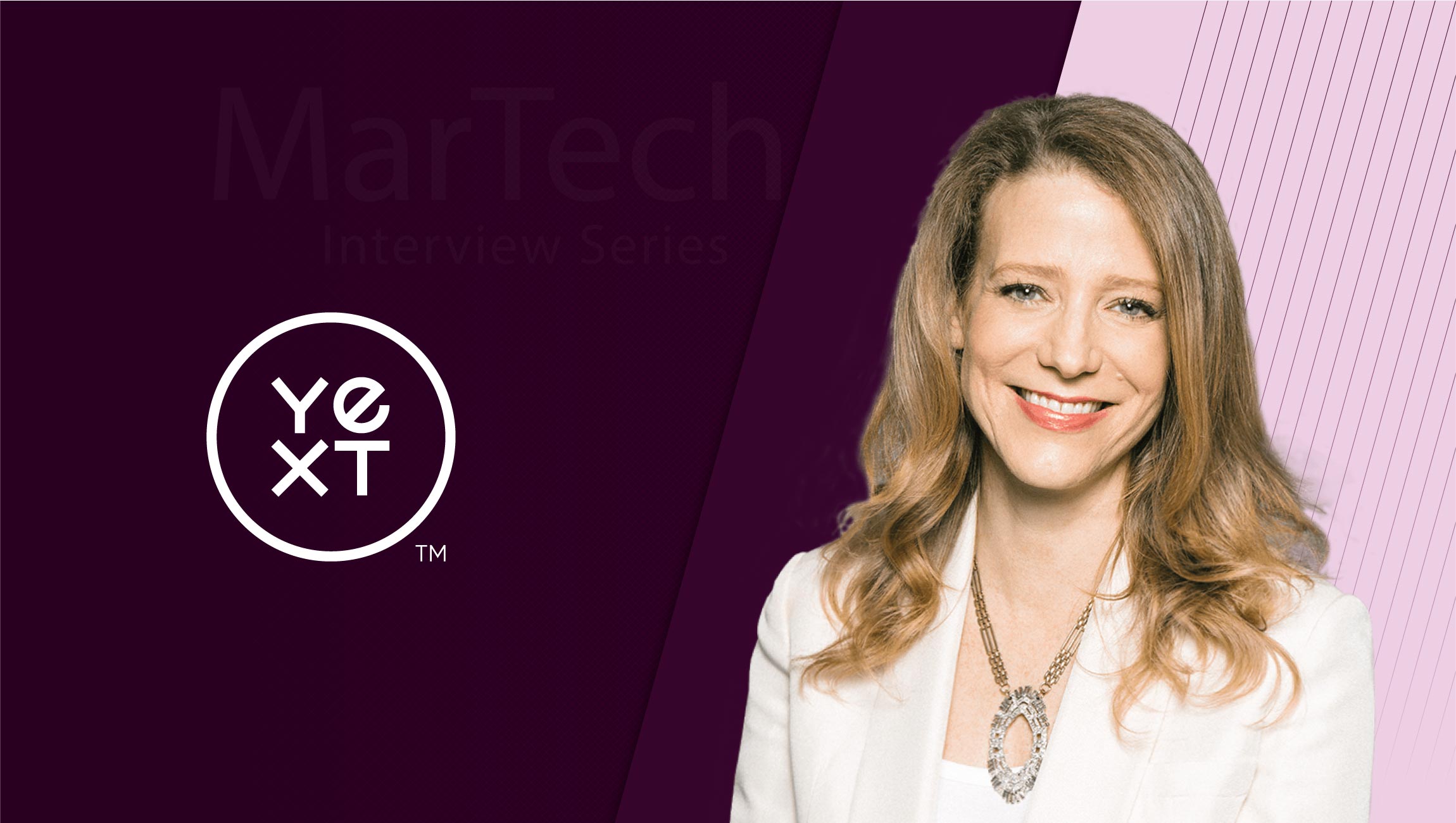“Customers expect accurate answers instantaneously, and those brands that deliver this stand to make huge gains against less search-savvy competitors.”
[/vc_wp_text]
Tell us about your role/team you handle at Yext. What inspired you to join the company?
After years at Yahoo after the Right Media acquisition, I was ready to go back to an earlier stage startup. The founder and Chairman of Right Media, Mike Walrath, told me about Howard and Brian, the founders of Yext, and he encouraged me to take a meeting with them. While the company was quite small, it was clear that the vision, innovation, strong leadership, and incredible engineering team were different from most companies I had met. I always look for companies that have a real impact on their customers’ business, and Yext has always focussed on converting consumer interactions to transactions and ensuring consumers have correct information no matter where they search.
Most people want to work for a company that has a great purpose they can believe in, and for me, Yext has that significant purpose by ensuring that there are no wrong answers for consumers. No wrong answers is a real rallying cry for the company right now!
In my current role as CEO of Europe, I’ve helped steer Yext across EMEA, from expanding our work across the region to helping take our most revolutionary product – Yext Answers – to market. Our current work combating misinformation around COVID-19 and providing Answers free to governing bodies in the US is just another way that Yext inspires me every day.
COVID-19 has blown the cover off many fake news peddlers. Yet, there’s no stopping them. What role is Yext playing to curb and report such Fake News sources?
With misinformation growing online, especially in a digital-first world, businesses and brands are often scrutinized for a lack of correct information. If a company doesn’t provide accurate answers to questions online, these wrong answers can actually cost a business revenue. Worse, during this pandemic, I believe wrong answers can actually cost lives.
We’re seeing thousands of companies around the world now scrambling to figure out how to answer their customers’ questions on how they’re handling COVID-19. Whether it’s a question to a healthcare provider about the efficacy of hand sanitizer, a question to an airline about their cancellation policies, or a question to a grocery store about the availability of bottled water, consumers are desperate for answers.
Yext wants to help, and our way of doing just that is to offer our Answers product to businesses for free during this time. Answers are specifically designed to allow businesses to provide correct, up-to-date information everywhere their customers are asking questions, which has never been more important given the current situation. Brands can also head to www.nowronganswers.com to take our No Wrong Answers Challenge, which shows businesses how well their website answers the most popular questions people are asking about them right now.
What’s more, our recently released COVID-19 Global Search and Engagement Report has shown an 84% increase in the number of updates clients have made on Yext’s platform. This indicates just how heavily businesses are relying on their Yext Knowledge Graphs to provide customers with accurate and timely information during the COVID-19 pandemic.
What technology is Yext providing to government bodies to deliver accurate COVID-19 information?
In addition to the State of New Jersey, we also recently worked with the State of Alabama and the US Department of State to provide answers, powered by NLP to help them understand the questions people ask about coronavirus; and then deliver answers using data collected from multiple state agencies, federal resources like the Centers for Disease Control and Prevention (CDC), and the Federation of American Scientists “Ask a Scientist” interactive tool.
This helps the governing bodies to stay responsive to the public’s concerns amid this rapidly evolving pandemic, helping monitor search data on the website to track new queries coming in, then ensuring people receive accurate, up-to-date answers to their questions.
These projects were initiated and launched in record time thanks to the hard work and dedication of the respective teams within these organizations. We were able to help them quickly because we leveraged our own existing technology; the Knowledge Graph powers the experience, and our Search Experience platform has been configured specifically for the coronavirus response.
What is the impact of misinformation/fake news on a brand?
The labels of misinformation or ‘fake news’ have been hotly debated over the past few years. Sometimes the label is accurate. Other times, it’s a suspected veil over an ugly truth. But whatever your interpretation of what these terms mean, one thing’s for certain: consumers now scrutinize people, news, and organizations much more than in the past.
And this is particularly damaging in the business world. Brands that share incorrect or misleading information face a significant number of risks – whether it’s a loss of revenue from consumers not having the right opening times or a larger loss of trust in a brand, one wrong fact could have huge repercussions for a company.
Regaining trust from disenfranchised customers will take a lot longer than it took to break. It could be years, even, before a company can win back trust.
While everyone knows about fake news, is business misinformation a more damaging or difficult issue?
It’s a different issue. While fake news can be created by any number of individuals or groups with a nefarious agenda, businesses failing to provide correct information – particularly at a time of crisis – could be just as damaging. I believe fundamentally that consumers deserve the right answers – and we rely on businesses to provide us with this.
The challenge that many brands face is actually understanding the information they have online, and the types of information that consumers are looking for from them. These two separate issues aren’t easily understood, and that’s where we can help. Building a Knowledge Graph through the Yext search experience cloud allows brands to maintain a single source of truth online for all the public facts about their brand, and maps any entity, from opening hours to professional qualifications. Without this structured approach, it is incredibly difficult for a business to tackle the issue of misinformation online.”
Is business misinformation a new issue, or is it that the reliance on online presence has made it worse for brands?
Misinformation has been around for a very long time. The internet has made the issue of business misinformation much more obvious. For instance, how often do you resolve a question by ‘Googling it’? Every brand’s customers are also doing this, and what they’re searching for is becoming more and more specific. So, if a brand fails to deliver the right answers to those questions, consumers will simply find a competitor which is offering the information they’re looking for.
That said, the combination of understanding what consumers are searching for and improving search technology is giving marketers the ability to understand what their customers want and when they want it. And this is a huge opportunity for brands, who can now appeal to and service their customers better than at any other time. Ultimately, customers expect accurate answers instantaneously, and those brands that deliver this stand to make huge gains against less search-savvy competitors.
Thank you, Wendi! That was fun and hope to see you back on MarTech Series soon.
Wendi is the CEO of Yext Europe. She has twenty years of experience as a technology and marketing leader at some of the world’s largest tech companies. Wendi has been a leader at Yext since joining the company in 2011, and has held a variety of executive roles, including leading Sales, Partnerships, Customer Success, and Consulting.
She has previously held executive positions at Oracle, Gartner, Right Media, and Yahoo!, where she was Vice President of Account Management for North America. She has served on multiple boards including Dailyworth.com, Student Transportation, Step Up Women’s Network, Georgia Tech Advisory Board, and the Georgia Tech Foundation.
Wendi is a graduate of Georgia Institute of Technology and an adjunct professor of business at Columbia Business School. She was named to the 40 Women to Watch Over 40 list in 2013.
The ultimate source for official answers about a business online should be the business itself. However, when consumers ask questions on company websites, too often they are left in the dark with wrong answers. Yext, the Search Experience Cloud, solves this problem by organizing a business’s facts so it can provide official answers to consumer questions — wherever people search. Starting with the company website, then extending across search engines and voice assistants, businesses around the world, like Taco Bell, Marriott, and Jaguar Land Rover—as well as organizations like the U.S. State Department—trust Yext to radically improve the search experience on their websites and across the entire search ecosystem.
Yext’s mission is to help businesses and organizations around the world deliver official answers everywhere people search. Yext has been named a Best Place to Work by Fortune and Great Place to Work, as well as a Best Workplace for Women. Yext is headquartered in New York City with offices in Amsterdam, Berlin, Chicago, Dallas, Geneva, London, Miami, Milan, Paris, San Francisco, Shanghai, Tokyo, and the Washington, D.C. area—and work-from-home offices all around the world.



